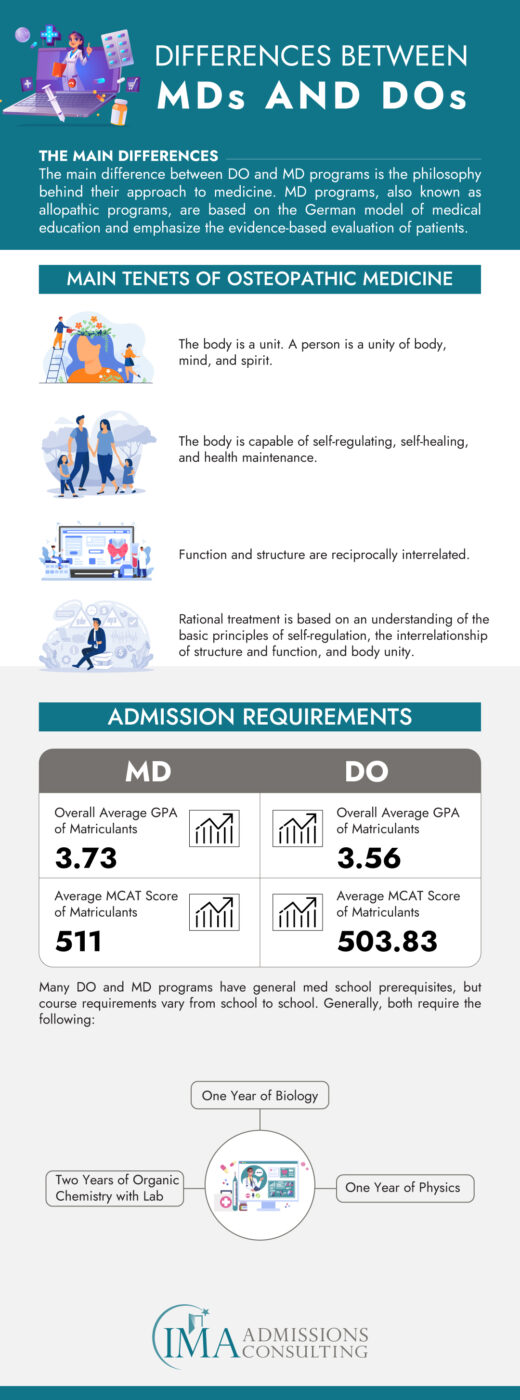Why Go from a Nurse to a Doctor?
It’s not uncommon for nurses to have once daydreamed about becoming a doctor. Many times, factors like financial constraints, time, and life circumstances cause potential physicians to pursue their second career choice instead. In other cases, those who have worked in the medical field for some time begin looking for career advancement options and other ways to help and interact with patients. They may feel like they are ready to take on new responsibilities and perhaps a new role in the hospital.
Sometimes it is simply intellectual curiosity that leads nurses to make a career switch. At some point, they may realize that they feel a genuine inclination toward making diagnoses and detecting and curing pathologies.
Others are motivated by the idea of career advancement opportunities. Nursing can be a highly gratifying profession, but becoming a physician implies developing further skills and competencies, gaining prestige, and aspiring for a higher salary, which can be quite attractive to some healthcare professionals.
In other cases, those who are currently nurses feel that their nursing experience and knowledge would make them ideal physicians as they already possess scientific and patient experience in the medical field. These professionals bring a comprehensive approach to healthcare. Doctors and nurses have vastly different approaches and ways of thinking. Doctors are more science-oriented, with their primary focus being on diagnosing and treating their patients, while nurses are more task-oriented, helping patients through their journey to recovery. Physicians who have nursing experience can combine both of these aspects of patient care and medicine in a way other medical professionals can not.
Advantages and Disadvantages of Going from Nurse to Doctor
Advantage: Quality Clinical Experience
One of the main advantages nurses have when applying to medical school is their extensive clinical experience. Nurses understand how a hospital works, have spent a considerable amount of time around patients, and have worked alongside doctors, so they know what to expect from the job. Nurses are also fully aware of the implications of being a doctor, like communicating bad news to patients and working long shifts. They are also already trained to perform many procedures involved in patient care and understand medical jargon.
Advantage: Appropriate Educational Background
Another key advantage that nurses have when deciding to go from nursing to med school is an already completed Bachelor’s degree that most likely includes many med school prerequisites required to become an MD or DO. The transition from nurse to doctor is much quicker than going from high school to medical school. Nurses are often able to skip ahead a few steps, going straight to the application process and MCAT.

Advantage: You Are Certain of Your Choice
Being a mature candidate and having a background in the medical field makes you more certain of your choice to attend medical school when compared to younger, inexperienced applicants. If you know how to make a strong case for yourself, highlighting your nursing experience when facing a school’s admissions committee, you will succeed in making your med school application stand out.
Disadvantage: Completing Medical School Requirements While Working as a Nurse
One of the biggest disadvantages you will face when transitioning from nursing to attending medical school is completing medical school requirements, such as prepping for the MCAT and completing additional courses while working. The medical school application process can be extremely challenging and discouraging for some, so going through the process while maintaining a full-time career that will likely impact your decision on whether to pursue this journey.
If you feel lost on how to approach applying for med school while working as a nurse, consider reaching out to International Medical Aid and inquiring about our medical school admissions consulting service. We can help you build a strong application strategy that will best help you juggle your job and medical school requirements. To schedule a consultation with one of our medical school admission consultants, fill out this form.
Disadvantage: Applying as a Nontraditional Applicant
Nurses are considered nontraditional medical school applicants, meaning they are not following the most direct path to med school. Those who apply to medical school after a career change can feel out of place and face obstacles that most traditional applicants do not. These obstacles can include having to retake courses that you completed many years before applying and lacking academic references.
To overcome these obstacles, nurses might choose to enroll in a post-bacc program for med school. A post-bacc program allows nurses to take the course required for medical school within 1 to 2 years.
Many applicants who are switching careers wonder if they are too old to be going back to school. There are no age requirements to enter medical school, but choosing to pursue a medical career at an older age is not an easy decision to make either. It can easily take a decade to begin working independently as a physician, meaning you will be much older than the majority of your colleagues, and with the rising cost of medical school, you will likely have a debt to pay off for years to come.
Disadvantage: Stigma Surrounding the Transition from Nurse to Doctor
It is not uncommon for nurses who aspire to become physicians to be discouraged by their mentors and colleagues. Doctors and nurses have different methods of interacting with patients. They also have different responsibilities and deal with different patient care aspects. Some believe that having too much experience as a nurse means that you are too indoctrinated and will feel out of place assuming a different role in healthcare.
Another concern some nurses have is whether or not their nursing experience will be an advantage when applying to medical school. While this may have been a controversial point in the past, more and more nurses are beginning to pursue other medical careers successfully.
How to Go from Nurse to Doctor
The journey from being a nurse to becoming a doctor will depend on your education, experience, and aspirations, but it will take a minimum of 7 years. Being aware of the investments you will need to make in terms of both time and money is essential to making this decision.
1. Take the Medical School Admissions Test (MCAT)
Nearly all medical school applicants will need to take the MCAT, unless they are applying to one of the few med schools that do not require the MCAT. You will need to develop a good study schedule and stick to the study schedule as much as possible. If you feel like being a nontraditional applicant will put you at a disadvantage, having a strong MCAT score will help your application stand out.
2. Meet the Medical School Requirements and Apply
In order to begin sending your med school application out to medical schools, you will need to make sure that you have completed all of the medical school requirements.
- Undergraduate Degree
- Medical School Prerequisites
- Extracurriculars (Clinical Experience, Research Experience, and Volunteer Experience)
- Letters of Recommendation
- GPA
- MCAT
- CASPer exam (If Required)
As a nurse, you will likely have undertaken most of the necessary prerequisites for medical school, but it may have been a long time ago, or your GPA may not have been overly impressive. Getting into medical school with a low GPA is much harder, so it would not be a bad idea to retake some of the courses. Plus, refreshing your knowledge on some of these concepts will come in handy when it comes to resuming your studies after years of being out of a classroom setting. Please keep in mind that some medical schools do not accept prerequisites from more than 5 years before your application, so it is crucial to make sure your requirements are up to date.
After sending in your application, you may be lucky enough to land an interview. It is normal for applicants to apply to many med schools and attend many interviews before getting accepted. After completing interviews, there isn’t much left to do except wait to hear back from the admissions committee. If you are accepted, you have until mid-May to accept an offer and turn down any others you may receive.
3. Complete Medical School
Once you’ve gotten into medical school, it is time to begin working on obtaining your MD or DO. While previous medical knowledge and your background as a registered nurse will be helpful during your studies, it does not mean you will complete your degree faster.
During medical school, you will have to pass the United States Medical Licensing Examination (USMLE) if you are based in the US or the Medical Council of Canada Qualifying Examination (MCQE) if you are based in Canada. These exams determine your readiness to enter supervised practice.
4. Complete Your Residency
You should begin applying for residency during your final year of medical school. Ideally, you will be graduating medical school with a clear path in mind. Having spent a few years in the healthcare field, chances are you already have an idea of which medical specialty you’d like to go into. However, you should keep your options open as you might develop an interest in other specialties or subspecialties during med school. Completing residency can take anywhere from 3 to 7 years, depending on the specialty you are pursuing.
Depending on your goals and willingness, you can become a specialist by completing a medical fellowship after completing your residency. Even if you decide to start your practice right after completing residency, you will continue to learn throughout your medical career
Is Becoming a Doctor the Right Choice for You?
Having the desire to make this career shift is a strong indicator that this might be the right course for you. However, it is important that you understand the sacrifices involved in the process. Medical school is long, expensive, and challenging. Attending medical school requires a great degree of determination and motivation. If you want to know if medical school is right for you, start by asking yourself what your professional goals are and what resources you have to accomplish these goals. If you can reach your career goals through other career advancement options, you may be able to save time and money by pursuing those instead.
Alternative Career Advancement for Nurses
If your decision and motivation to embark on the journey of medical school had to do with finding better job opportunities, but you don’t feel ready to make the drastic change from nurse to med school student, you may want to seek alternative career advancement options.
One alternative option is to become a nurse anesthetist by completing a CRNA (Certified Registered Nurse Anesthetist) program. The program usually lasts 3 years and allows nurses to work with patients who have or are about to receive anesthesia. CRNAs work with a wide variety of patients and with a wide variety of healthcare professionals.
If anesthesia isn’t up your alley, you can pursue an NP (Nurse Practitioner) program. NPs are nurses who have an advanced practice degree. They are trained to prescribe medications, interpret and assess medical tests, and diagnose diseases. NPs receive more training than a nurse but less training than a doctor. If you already have an RN degree, obtaining an NP degree will take an additional 2 years, so this is a great option for those who may be intimidated by the lengthy medical school process.
Conclusion
As a mature applicant, you should be prepared to discuss your career change and why you want to become a doctor in your med school application and interviews. It is important to discuss this change in a positive way.
Keep in mind that transitioning from being a nurse to becoming a doctor is a long journey, and while having a background in healthcare will provide some advantages, you need to be fully convinced that this is the path you want to take. One way to help ensure that this path is the best path for you is to partake in a pre-med shadowing study abroad program. These programs will allow you to shadow doctors, help the medically underserved, and gain further insight about what it is like being a physician.
FAQs
Do medical schools accept nurses as students?
Yes, depending on your clinical experience and background, being a nurse will even be considered an advantage when applying to medical schools. There are many medical schools that accept nurses as students throughout the US and Canada.
How long does it take to transition from nurse to doctor?
Typically, medical school takes a minimum of 7 years but may take longer depending on your desired specialty.
Do nurses need to take the MCAT?
Yes, all medical school applicants must complete the MCAT.
Is there an age limit for entering medical school?
No, there is no age limit for entering medical school. However, mature applicants may feel that they are at a disadvantage compared to their younger counterparts as they may need to retake courses.
Do I have to retake courses?
Not necessarily. Having completed your degree to become a nurse means you have likely completed all of the medical school prerequisites. However, most colleges will not accept courses completed more than 5 years before application, so if it has been 5 or more years since you’ve taken these courses, you will need to retake them.
Can a nurse practitioner become a doctor?
Yes, an NP can become an MD or DO if they choose to attend medical school. Much like transitioning from a nurse to a doctor, this process will take at least 7 years. Unfortunately, there are not currently any NP to MD bridge programs offered by US colleges.
If you need help deciding which career advancement path is right for you or planning your application strategy, contact IMA to learn more about our medical school admissions consulting and consider taking part in a pre-med shadowing study abroad program.







